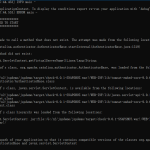This module achieves session stickiness with the session cookie for Nginx. If the cookie is absent, the module will be a normal Round-Robin upstream module.
这个模块为nginx针对基于cookie方式session实现session(会话)粘连(会话保持). 如果cookie不存在, 这个模块将实现一个轮询方式的转发.
模块下载地址:
https://code.google.com/p/nginx-upstream-jvm-route/
nginx_upstream_jvm_route
This module achieves session stickiness with the session cookie. If the session is not in the cookie or URL, the module will be a normal Round-Robin upstream module.
此处文档同上面文档中, 仅仅基于cookie的方式多个url方式(url重载方式实现会话跟踪),略有出入.具体情况.
cd nginx-0.7.59 # or whatever
patch -p0 < /path/to/this/directory/jvm_route.patch
compile nginx with the following addition option:
--add-module=/path/to/this/directory
1.For resin
upstream backend {
server 192.168.0.100 srun_id=a;
server 192.168.0.101 srun_id=b;
server 192.168.0.102 srun_id=c;
server 192.168.0.103 srun_id=d;
jvm_route $cookie_JSESSIONID;
}
2.For tomcat
upstream backend {
server 192.168.0.100 srun_id=a;
server 192.168.0.101 srun_id=b;
server 192.168.0.102 srun_id=c;
server 192.168.0.103 srun_id=d;
jvm_route $cookie_JSESSIONID reverse;
}
3. A simple jave test page
syntax: jvm_route $cookie_COOKIE[|session_url] [reverse]
default: none
context: upstream
description:
'$cookie_SESSION_COOKIE' specifies the session cookie name(0.7.24+). 'session_url' specifies a different session name in the URL when the client does not accept a cookie. The session name is case-insensitive. In this module, if it does not find the session_url, it will use the session cookie name instead. So if the session name in cookie is the name with its in URL, you don't need give the session_url name.
With scanning this cookie, the module will send the request to right backend server. As far as I know, the resin's srun_id name is in the head of cookie. For example, requests with cookie value 'a***' are always sent to the server with the srun_id of 'a'. But tomcat's JSESSIONID is opposite, which is like '***.a'. The parameter of 'reverse' specifies the cookie scanned from tail to head.
If the request fails to be sent to the chosen backend server, It will try another server with the Round-Robin mode until all the upstream servers tried. The directive proxy_next_upstream can specify in what cases the request will be transmitted to the next server. If you want to force the session sticky, you can set 'proxy_next_upstream off'.
Every syntax is the same with the official directive except the parameter of 'srun_id' which identified the backend JVM's name by cookie. The default srun_id's value is 'a';
This is a third-party module. And you need careful test before using this module in your production environment.
Questions/patches may be directed to Weibin Yao, yaoweibin@gmail.com.


